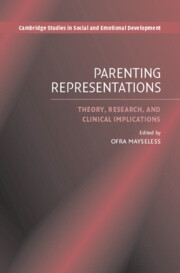Book contents
- Frontmatter
- Contents
- List of Illustrations
- List of Tables
- List of Appendixes
- List of Contributors
- Preface
- Acknowledgments
- Part One Theoretical Perspectives
- Part Two Research Applications
- 4 Communicating Feelings: Links Between Mothers' Representations of Their Infants, Parenting, and Infant Emotional Development
- 5 The Dual Viewpoints of Mother and Child on Their Relationship: A Longitudinal Study of Interaction and Representation
- 6 Modeling and Reworking Childhood Experiences: Involved Fathers' Representations of Being Parented and of Parenting a Preschool Child
- 7 Maternal Representations of Parenting in Adolescence and Psychosocial Functioning of Mothers and Adolescents
- 8 Like Fathers, Like Sons? Fathers' Attitudes to Childrearing in Light of Their Perceived Relationships with Own Parents, and Their Attachment Concerns
- Part Three Clinical Implications
- Index
- Cambridge Studies in Social and Emotional Development
- References
4 - Communicating Feelings: Links Between Mothers' Representations of Their Infants, Parenting, and Infant Emotional Development
from Part Two - Research Applications
Published online by Cambridge University Press: 10 July 2009
- Frontmatter
- Contents
- List of Illustrations
- List of Tables
- List of Appendixes
- List of Contributors
- Preface
- Acknowledgments
- Part One Theoretical Perspectives
- Part Two Research Applications
- 4 Communicating Feelings: Links Between Mothers' Representations of Their Infants, Parenting, and Infant Emotional Development
- 5 The Dual Viewpoints of Mother and Child on Their Relationship: A Longitudinal Study of Interaction and Representation
- 6 Modeling and Reworking Childhood Experiences: Involved Fathers' Representations of Being Parented and of Parenting a Preschool Child
- 7 Maternal Representations of Parenting in Adolescence and Psychosocial Functioning of Mothers and Adolescents
- 8 Like Fathers, Like Sons? Fathers' Attitudes to Childrearing in Light of Their Perceived Relationships with Own Parents, and Their Attachment Concerns
- Part Three Clinical Implications
- Index
- Cambridge Studies in Social and Emotional Development
- References
Summary
Abstract
In the present chapter we explore how mothers' internal working models of their seven-month-old infants organize emotions in the parenting context, and ultimately, influence infant emotion regulation. We propose that mothers' internal working models of their infants function as emotion regulators, and influence a variety of components of the affective organization of parenting, including a) maternal emotion activation, b) qualities of maternal emotional engagement with their infants, and c) emotion regulation strategies mothers employ during emotionally challenging interactions. Results underscore the important role played by emotional processes in explaining the correspondence between maternal and infant emotion regulation strategies.
The relationship with a primary caregiver is the emotional cocoon from which the infant's social and emotional self develops and emerges. Developmentalists from a range of theoretical perspectives have underscored the centrality of the parent–infant relationship for early infant emotional development and emphasize the belief that parent–infant interaction during the earliest months may serve as the foundation for the differentiation of the self (Fonagy, 1999; Mahler, Pine, & Bergman, 1975; Sameroff & Emde, 1989; Winnicott, 1965). In other words, the self is born out of relationships and develops as part of, and within, a specific relational context.
Relationships are inherently affective bonds between individuals, and thus, not surprisingly, affective processes play a central role in the attachment and caregiving behavioral systems.
- Type
- Chapter
- Information
- Parenting RepresentationsTheory, Research, and Clinical Implications, pp. 109 - 148Publisher: Cambridge University PressPrint publication year: 2006
References
- 26
- Cited by

